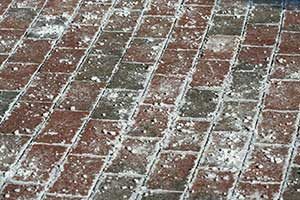
Property owners, business tenants and other individuals legally responsible to maintain property in Rhode Island and Providence Plantations and in the Commonwealth of Massachusetts are required by law to ensure that walkways, stairs and sideways are free of accumulated ice and snow. This is because pedestrians have a heightened potential risk of suffering serious injuries in a slip and fall accident during the winter months. Removing or treating accumulated snow and ice is crucial for the safety of individuals in RI and MA who use the walkways, parking lots and sidewalks on public and private property.
Snowfall, Ice and accident
The cold extreme weather during the winter months in Providence and Boston can cause typically safe outdoor environments to become extremely hazardous during and after snowfalls and ice storms. If removal of the accumulated precipitation cannot be accomplished in a reasonable time, property owners and others in charge of the premises in Mass. and in Cranston / Warwick are required to ensure the warning sign or barricade is in place to minimize the potential of anyone getting hurt. This is true for every commercial property in Rhode Island and Massachusetts including retail stores, grocery stores and malls.
If you were injured in a premises liability accident in RI or Mass, please contact a Rhode Island personal injury lawyer / slip and fall attorney in Rhode Island or a MA premises liability attorney. If the icy or snowy condition is not properly treated to ensure a safe environment within a reasonable amount of time, serious consequences can develop. The increased potential of slipping and falling In RI and MA can cause serious injuries including brain damage, herniated disk head wounds, spinal cord injuries and broken bones.
Common Snow and Ice Accidents in Providence and Boston MA
A slip, trip or fall can occur on any type of surface especially packed snow and hardened ice. Serious injuries can happen on steps, ramps, stairways, stairs, raised platforms, sidewalks and parking lots. The most common negligent causes found in most slip and fall premises liability lawsuits involve:
• Inadequate removal of accumulated ice and snow
• Failure to maintain the hazardous area using adequate sand, salt or ash
• Leaving the accumulated snow or ice for an extended period of time
• Icy handrails
• Leaking pipes and drains
• Failing to remove hardened hanging icicles
• Failing to maintain or remove any overhanging object
• Failing to clean away accumulated snow to ensure safe passage of visitors and others on the premises
The law that mandates premises liability uses reasonableness as the parameter for naturally accumulated ice and snow. This means that a business must remove accumulated precipitation in a reasonable manner and a length of time that any reasonable individual would expect. As an example, a reasonable individual would not expect the natural accumulation of ice or snow to be removed from the area during a snowfall or ice storm or immediately afterwards.
Rhode Island law concerning duty to remove ice and snow
However, if the accumulation is allowed to remain in the area for an extended period of time, a reasonable individual would likely claim those in charge of the premises are legally liable to the victim and financially accountable to any harm caused as a result of their negligence.
The top Court in Rhode Island, the RI Supreme Court sitting in the Capital City of Providence adopted the so called “Connecticut rule” when the tribunal ruled “…landlord or business invitor owes a duty to a tenant or business invitee to use reasonable care to see that the common areas are kept reasonably safe from the dangers created by an accumulation of snow and ice which is attributed to purely natural causes.” However, the Court stated “The landlord or invitor, however, must be afforded a reasonable time after the storm has ceased to remove the accumulation. ”
The RI Supreme Court reasoned “Therefore, as a general rule, any duty to clear a natural accumulation of ice and snow is not triggered before a reasonable time after the storm ends. Under unusual circumstances, however, the duty to remove the accumulation may arise before the end of the storm….Absent unusual circumstances, the law allows a landlord or business owner a reasonable time to remove a natural accumulation of ice or snow from the premises because it is unreasonable that he be “required to be at his property, shovel in hand, catching the flakes before they hit the ground…To require a landlord or other inviter to keep walks and steps clear of dangerous accumulations of ice, sleet or snow or to spread sand or ashes while a storm continues is inexpedient and impractical.” Berardis v LOUANGXAY Supreme Court of Rhode Island. Carlo P. BERARDIS v. Bounthinh LOUANGXAY et al. No. 2008-184-Appeal. Decided: May 12, 2009 Present: GOLDBERG, Acting C.J., FLAHERTY, SUTTELL, ROBINSON, JJ., and WILLIAMS, C.J. (ret.). Michael S. Pezzullo, Esq., Providence, for Plaintiff. Robert S. Ciresi, Esq., North Providence, Kathryn J. Hopkins, Esq., Cranston, for Defendant.
Improperly salted walkways during icy and snowy conditions can lead to accidents and injuries. Salt is commonly used as a de-icer to help melt ice and snow on sidewalks, driveways, and other walkways to prevent slips and falls. However, when salt is not applied correctly or in the right amount, it can create several issues:
- Ineffective Ice and Snow Removal: If salt is not spread evenly or at an appropriate rate, it may not effectively melt the ice and snow. This can leave slippery patches on walkways, which can be hazardous for pedestrians.
- Refreezing: When salt is not applied in sufficient quantities, it may melt the ice initially, but if the temperature drops, the melted ice can refreeze, creating a new layer of ice on the walkway.
- Environmental Impact: Excessive use of salt can harm the environment by contaminating nearby soil and water bodies. It can also damage vegetation and harm wildlife.
- Corrosion: Overuse of salt can corrode metal surfaces, such as handrails and vehicles, leading to additional safety concerns and maintenance costs.
To prevent accidents related to improperly salted walkways, it’s essential to take the following precautions:
- Use the right amount of salt: Follow recommended guidelines for the amount of salt to use based on the area you need to treat. Overuse can be wasteful and environmentally harmful, while underuse may not effectively clear the ice and snow.
- Spread salt evenly: Distribute salt evenly across the entire walkway to ensure uniform melting of ice and snow.
- Shovel before applying salt: Remove as much snow and ice as possible before applying salt. This will help the salt work more efficiently and prevent refreezing.
- Monitor weather conditions: Be aware of upcoming weather conditions and apply salt in advance when possible to prevent ice formation.
- Use alternative de-icers: There are alternative de-icing materials available that are less harmful to the environment, such as calcium magnesium acetate (CMA) or sand.
- Consider non-salt methods: Mechanical methods, like snow blowers and heated walkways, can also be used to prevent icy walkways.
It’s crucial to balance the need for safety with environmental and safety considerations when dealing with icy and snowy conditions. Proper salting practices can help mitigate accidents while minimizing the negative impact on the environment.
Massachusetts law concerning snow and ice removal
In the seminal case of PAPADOPOULOS vs. TARGET CORPORATION the MA Supreme Judicial Court adopted the “Connecticut Rule”, creating a reasonableness standard in MA for removal of ice and snow by landowners. “The reasonable care standard we adopt is sometimes referred to as the “Connecticut rule,” because of the Supreme Court of Connecticut’s decision in Reardon v. Shimelman, 102 Conn. 383 (1925), rejecting the Massachusetts rule of natural accumulation and adopting instead a rule requiring a landlord to exercise reasonable care in preventing dangerous conditions in common areas due to accumulations of snow and ice. See, e.g., Makeeff v. Bismarck, 693 N.W.2d 639, 642 (N.D.2005); 2 N.J. Landau & E.C. Martin, Premises Liability Law and Practice § 8A.04[2][c], at 8A-122–8A-125 (2010). The majority of States have followed the Connecticut rule rather than the Massachusetts rule of natural accumulation. “See id. at 8A-122–8A-123. See also G. Weissenberger & B.B. McFarland, Premises Liability § 4.6, at 102-104; § 9.15, at 259-261 (2001), and cases cited. EMANUEL PAPADOPOULOS & another vs. TARGET CORPORATION & another. 457 Mass. 368February 8, 2010 – July 26, 2010 Court Below: Superior Court, Suffolk Present: MARSHALL, C.J., IRELAND, SPINA, COWIN, CORDY, BOTSFORD, & GANTS, JJ.
Hiring a Lawyer
If you, or your loved one, have suffered minor to serious injuries caused by slipping or falling on ice or snow, you likely have the right to seek financial recompense from every individual or entity responsible for your accident. This is true even if your slip and fall accident occurred on government property like a city sidewalk or county parking lot.
However, all premises liability slip and fall accident cases are often complex to litigate, and require the skills of a competent Rhode Island personal injury attorney who handles these specific types of slip and falls in RI. A RI slip and fall attorney or MA slip and fall lawyers working on your behalf can assist you in gaining compensation by investigating your claim and building a case for financial recompense against all parties negligently at fault for your harm. These types of premises liaility cases are typically handled through a contingency fee agreement, meaning that the Providence slip and fall attorneys or the Boston personal injury lawyers provide immediate legal services and advice without the need of paying an upfront fee.
See also “Current research on slips and falls has mainly focused on floors and/or contaminated floors. Although icy and snowy surfaces near melting temperature are more slippery, more important still, slip and falls on icy and snowy surfaces involve not only outdoor workers, but also pedestrians and the general public; and occur in cold regions and in the winter season in many parts of the world. However, in comparison with the size of the problem, research work done so far in this area has been limited.” NCBI
Legal Notice per Rules of Professional Responsibility: The Rhode Island Supreme Court licenses all lawyers and attorneys in the general practice of law, but does not license or certify any lawyer / attorney as an expert or specialist in any field of practice. While this firm maintains joint responsibility, most cases of this type are referred to other attorneys for principle responsibility.

